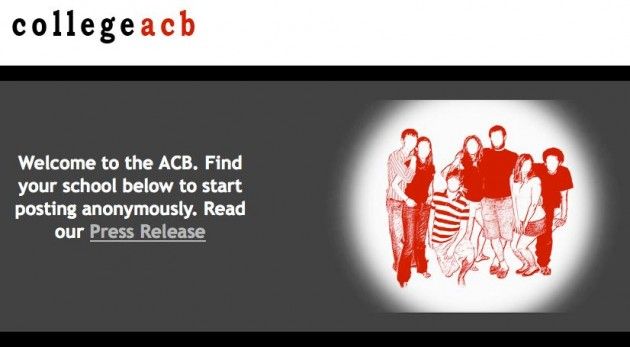Overprotected: Don’t Censor the Internet
I am definitely way behind the times here. I only found out about Colgate blocking student access to the College ACB website when the Maroon-News covered it last week, and it has been going on since October!
In my defense, many members of the senior class are put off by the site due to a panic that occurred on campus during our first year, which was caused by a Colgate student’s post on JuicyCampus (College ACB’s predecessor) saying that he might be able to get the school shut down if he threatened to shoot everyone in his second class the next day.
JuicyCampus was horrible. College ACB is horrible. On its Colgate board there are subject threads ranging from “whose ass looks the best in leggings” to “rank the pledge classes” to “who bangs the most girls.”
There are entire threads about individual students. It is filth. It often exemplifies the worst of human nature, and people who use the site’s anonymity to harrass others by name (especially in light of recent bullying-related events at other universities) are cowards. In my opinion, the site contains virtually nothing of value.
But the same could be said about a great deal of the Internet. Certainly pornography is objectionable to some, as are the sites for the Ku Klux Klan and NAMBLA, yet the university makes no effort to block these sites from its network.
After the JuicyCampus incident, many students called not only for a boycott of the site, but also for the university to block JuicyCampus from the school’s computers. Chief Information Officer David Gregory responded at the time that, “We don’t do that; if we tried to block access to offensive sites on the Internet, that’s all we’d ever do.”
Which is why Deans Johnson and Roelofs are not optimistic that a plan will ever be put in place for determining what sites should be blocked – it is unfeasible. How could you possibly draw a line in the sand of the Internet? Where could you start?
Dean Roelofs argued that the ban prevents Colgate resources (read: bandwidth) from being used in an inappropriate manner. Which is all well and good; it is their network. But surely sites like Facebook, Netflix and Hulu are of questionable educational value. And SparkNotes can actually be used to undermine the educational experience, as can sites for essay-writing services and automatic translators.
College ACB can still be accessed through the Colgate network through proxy servers, which is why Dean Johnson said that, “the block was largely symbolic.” So, if not to practically stop students from accessing the site, the block was intended to send a message: the Colgate community will not accept libelous attacks on its own students by its own students.
It is, then, a form of protection. But protection and censorship often have a muddled relationship. In admittedly extreme examples: there were times when students were “protected” from learning about safe sex or about communism. As students, don’t we have the duty to decline protection when it comes to information or opinions?
The university has declared that it can unilaterally decide what students can and cannot (or practically, should and should not) view on the Internet.
Now, I am not a conspiracy theorist. I am sure the administration will probably never block another website, unless JuicyCampus comes out with yet another incarnation. However, the fact of the matter is that there is a part of the Internet that someone has (symbolically) decided that I cannot access. There is information out there that someone else has decided that I cannot see. Please, do me a favor and stop protecting me. I have no wish to spend any time on College ACB, but my argument is simple: Let me choose for myself.









